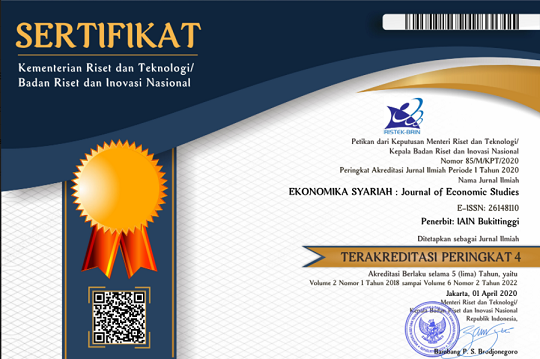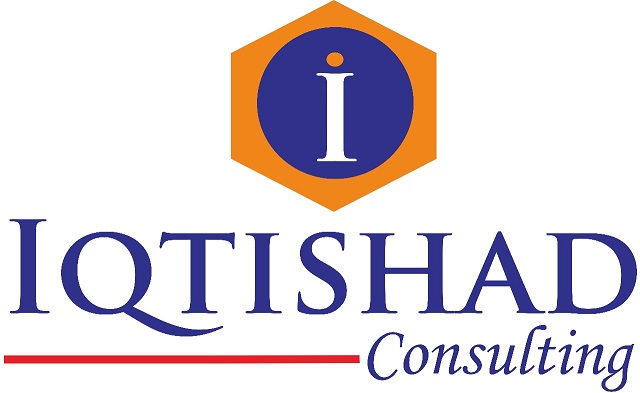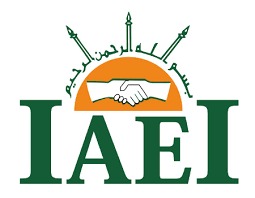Integration of Using Fintech and Social Media for The Business Sustainability in Pesantren
DOI:
https://doi.org/10.30983/es.v6i2.6024Keywords:
business, fintech, social media, pesantren sdgs, society 5.0.bisnis, media sosial, pondok pesantren, sdgs, society 5.0.Abstract
The urgency in utilizing fintech and social media in business to realize the Halal Value Chain (HVC) is paramount because it can provide added economic value for halal business actors, including Islamic boarding schools in the era of Society 5.0. This study aims to analyze the optimization of financial technology and social media integration in halal businesses managed by Islamic boarding schools to achieve the SDGs in the 5.0 era. This study uses phenomenology with data sources from Islamic boarding schools in Central Sulawesi. This research reveals that the integration relationship between fintech and social media highly depends on optimizing both. Factors driving the use of fintech and social media in Islamic boarding schools business consist of internal factors in the form of pesantren awareness of the importance of sustainable business activities and the vision of independence that exists in Islamic boarding schools. Furthermore, internal driving factors include the Covid-19 pandemic, market growth, digital market behavior, market growth, digital access, and customer behavior. Optimizing the use of social media in market mapping to see market demand trends has implications for Islamic boarding school business strategies in developing products.
References
Book
Armanios, Febe, and Bogac Ergene, Halal Food; a History (United States of America: Oxford University Press, 2018)
Journal
Abbas, J., S. Mahmood, M. A. Raza, G. Ali, J. Aman, S. Bano, and others, “The Effects of Corporate Social Responsibility Practices and Environmental Factors Through a Moderating Role of Social Media Marketing on Sustainable Performance of Business Firms,†Sustainability (Switzerland), 11.12 (2019)
Ahwarumi, Biyati, and Tjiptohadi Sawarjuwono, “Enhancing Innovation Roles of Pesantren Business Incubator in Pondok Pesantren Sunan Drajat,†Journal of Innovation in Business and Economics, 1.02 (2017), 71–82
Al-Okaily, M., A. R. Al-Natour, F. Shihan, F. Al-Dmour, R. Alghazzawi, and M. Alsharairi, “Sustainable FinTech Innovation Orientation: A Moderated Model.,†Sustainability, 13.24 (2021)
Bughin, J., M. Chui, and A. Miller, “Using Social Media For Competitive Business Outcomes: An Empirical Study Of Companies In China,†Journal of Advances in Management Research, 15.2 (2018), 211–35
Garcia-Morales, V. J., R. Martin-Rojas, and M. E. Lardon-Lopez, “Influence of Social Media Technologies Oo Organizational Performance Through Knowledge and Innovation,†Baltic Journal of Management, 13.3 (2017), 345–67
Giglio, F., “Fintech: A Literature Review,†International Business Research, 15.1 (2022), 80–85
Hinson, Robert, Robert Lensink, and Annika Mueller, “Transforming Agribusiness in Developing Countries: SDGs and the Role of FinTech,†Current Opinion in Environmental Sustainability, 41 (2019), 1–9 <https://doi.org/10.1016/j.cosust.2019.07.002>
Joni, Yefri, and Adelina Zuleika, “Wakaf Sebagai Alternatif Pengelolaan Dana Tabarru’pada Takaful,†EKONOMIKA SYARIAH: Journal of Economic Studies, 1.2 (2018)
Khalid, Mohammad Mahyuddin;, Mohd. Ashrof Zaki; Yakoob, and et.al, “Risk Analysis in the Halal Food Industry: An Exploratory Study,†in Contemporary Issues and Development in the Global Halal Industry, ed. by Mardhiyyah Ab. Manan, Siti Khadihah; Abd. Rahman, Fadilah; Sahri (Singapore: Springer Science+Business Media Singapore, 2016), pp. 67–79 <https://doi.org/10.1007/978-981-10-1452-9_44>
Lee, I., and Y. J. Shin, “Fintech: Ecosystem, Business Models, Investment Decisions, and Challenges,†Business Horizons, 6.1 (2018), 35–46
Leong, K., and A. Sung, “FinTech (Financial Technology): What Is It and How to Use Technologies to Create Business Value in FinTech Way?,†International Journal of Innovation, Management and Technology, 9.2 (2018), 74–78
Mahfud, M., and A. Hairit, “Pondok Pesantren Masa Depan (Studi Pola Manajemen PP. Nahdlatun Nasyiin Bungbaruh Kadur Pamekasan),†Fikratuna, 4.2 (2016)
Mohd Noor, Mohd Ali, Mohammed Rizki Moi, and Radiah Abdul Kader, “The Efficiency of Halal Processed Food Industry in Malaysia,†Global Journal Al-Thaqafah, 6.1 (2016), 37–46 <https://doi.org/10.7187/gjat10120160601>
Mulato, Tri, and Nursyamsu Nursyamsu, “The Strengthening Role of Islamic Financial Institutions For The Real Sector of SMEs,†Jurnal Iqtisaduna, 2019, 120–38
Mulyani, E. L., L. R. Rinandiyana, and A. Nurfahmi, “Pemanfaatan Teknologi Informasi Dalam Rangka Pengembangan SDM Yang Unggul Dan Berkualitas Pada SMP IT Daarussalaam Tasikmalaya,†Jurnal Bakti Masyarakat Indonesia, 1.1 (2018), 115–23
Obsohonka, M., C. Fisch, and R. Boyd, “Using Digital Footprints in Entrepreneurship Research: A Twitter-Based Personality Analysis of Superstar Entrepreneurs and Managers,†J. Bus. Ventur. Insights, 8 (2017), 13–23
Owens, J., “Offering Digital Financial Services to Promote Financial Inclusion: Lessons We Learned,†Innovations: Technology, Governance, Globalization, 8.1 (2013), 271–82
Puspaningrum, A., “Social Media Marketing and Brand Loyalty: The Role of Brand Trust,†Journal of Asian Finance, Economics and Business, 7.12 (2020), 951–58
Rana, N. P., D. J. Barnard, A. M. A. Baabdullah, and D. Rees, “Exploring Barriers of M-Commerce Adoption in SMEs in the UK: Developing a Framework Using ISM,†International Journal of Information Management, 44 (2019), 141–53
Rosmala, Triska, Nursyamsu Nursyamsu, and Ahmad Haekal, “Pengelolaan Dana Wakaf Oleh Alkhairaatdi Kota Palu,†1.1 (2019)
Rozaidin, Muhamad, and Hendri Hermawan Adinugraha, “Penerapan Akuntansi Pondok Pesantren (Studi Pada Koperasi Pondok Pesantren Al Hasyimi Kabupaten Pekalongan),†EKONOMIKA SYARIAH: Journal of Economic Studies, 4.2 (2020), 123–35
Schueffel, P., “Taming the Beast: A Scientific Definition of Fintech,†Journal of Innovation Management, 4.4 (2016), 32–54
Shahidan, N. H., A. S. A Latiff, and S. A. Wahab, “Moving Towards Society 5.0: A Bibliometric and Visualization Analysis,†in International Conference on Society 5.0, 2021
Shikoh, Rafiuddin, Mian N. Riaz, and Munir M. Chaudry, “Global Halal Economy,†in Handbook of Halal Food Production, ed. by Mian N Riaz and Muhammad M. Chaudry (Boca Raton: CRC Press, 2019)
Sullivan, Y. E., and C.E. Koh, “Social Media Enablers and Inhibitors: Understanding Their Relationships in a Social Networking Site Contex,†International Journal of Information Managemen, 49 (2017), 170–89
Tarsakoo, P., and P. Charoensukmongkol, “Dimensions of Social Media Marketing Capabilities and Their Contribution to Business Performance of Firms in Thailand,†Journal of Asia Business Studies, 14.4 (2020), 441–61
Trimulato, Trimulato, Nur Syamsu, and Mega Octaviany, “Sustainable Development Goals (SDGs) Melalui Pembiayaan Produktif UMKM Di Bank Syariah,†Islamic Review: Jurnal Riset Dan Kajian Keislaman, 10.1 (2021), 19–38
Zeingin, Y., S. Naktiyok, E. Kaygin, O. Kavak, and E. Toplcuoglu, “An Investigation upon Industry 4.0 and Society 5.0 within the Context of Sustainable Development Goals,†Sustainability, 13.5 (2021)
Website
Alkhairaat, “Dua Pesantren Alkhairaat Terima Bantuan Unit Usaha Dari Bank Indonesia,†https://alkhairaat.sch.id/dua-pesantren-alkhairaat-terima-bantuan-unit-usaha-dari-bank-indonesia/25/02/2020/
info pesantren, “15+ Pondok Pesantren Terbaik Di Sulawesi Tengah (Sulteng) Yang Menjadi Pilihan,†2021 https://www.infopesantren.com/2021/12/pondok-pesantren-di-sulawesi-tengah.html
Downloads
Submitted
Accepted
Published
Issue
Section
License
Authors who publish with this journal agree to the following terms:
- Authors retain copyright and grant the journal right of first publication with the work simultaneously licensed under a Creative Commons Attribution-ShareAlike 4.0 International License that allows others to share the work with an acknowledgment of the work's authorship and initial publication in this journal.
- Authors are able to enter into separate, additional contractual arrangements for the non-exclusive distribution of the journal's published version of the work (e.g., post it to an institutional repository or publish it in a book), with an acknowledgment of its initial publication in this journal.
- Authors are permitted and encouraged to post their work online (e.g., in institutional repositories or on their website) prior to and during the submission process, as it can lead to productive exchanges, as well as earlier and greater citation of published work (See The Effect of Open Access).












